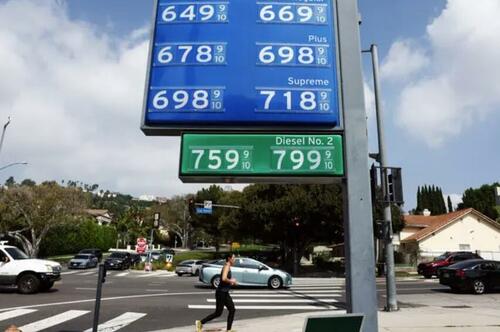
Authored by Salena Zito via The Epoch Times,
Two weeks ago, Nobel Prize-winning economist Paul Krugman told CNN anchor Christiane Amanpour there is a peculiar disconnect between how the economy is doing and how the public is feeling about it.
Amanpour pressed him on why people weren’t understanding that they are living in a “sunny economy.”
He had asserted that “the economy’s rebound has been surreally good,” yet people keep saying it is terrible.
Krugman pointed to surveys and even some people’s behavior, noting robust discretionary spending on travel with hotels and restaurants, and was perplexed as to why people, as if all people were traveling, thought there was a problem.
“We don’t really understand why this is happening ... (but) there is a real profound disconnect going on,” Krugman said.
A few days earlier, “The View” co-host Joy Behar was strident in her assertion that everything was fine for all in our economy:
“The economy is booming, inflation is down, the stock market is doing well, people are having an easier time putting bread on the table, etc. (Biden) doesn’t seem to be getting the credit for that.”
She then asked if people think because Biden is old that the economy is bad.
Huh?
People think the economy is bad because they are paying, at least here in western Pennsylvania, $3.99 a gallon for gas, and in places such as Arizona, where the state now ranks seventh among the nation’s highest-paying markets at $4.69; last week alone it climbed 14 cents a gallon. In Nevada, it jumped a whopping 33 cents a gallon, with California coming in at a 29-cents-a-gallon jump.
When gas prices rise, food prices rise.
Has Krugman or Behar bought milk lately?
A staple in almost every family’s home is now well over a dollar more a gallon than it was in 2021, with the average price at $4.31 per gallon for conventional whole milk, $4.26 per gallon for conventional reduced-fat 2 percent milk, $4.86 per half-gallon organic whole milk, and $4.86 per half-gallon organic reduced-fat 2 percent milk.
And that is just one food staple. The USDA said this week that on top of the already escalated costs, all food prices are predicted soon to increase another 5.8 percent, with a prediction interval of 5.4 percent to 6.2 percent.
And food-away-from-home prices are predicted to increase 7.1 percent, with a prediction interval of 6.9 percent to 7.4 percent.
Ardell Martin, a retiree who lives on a fixed income, said her trips to the grocery store, a thing she used to enjoy, now fill her with dread.
“Everything has gone up, and gone up a lot,” she said.
“What irks me is that people keep telling us that everything is fine. Well, everything is not fine. When your income doesn’t change but the costs of basics keep going, your ability to find what you need shrinks because you cannot afford it.”
Interviews with a number of voters across the political and economic spectrum find them frustrated by the Biden administration not understanding that by the administration’s measure, the economy is doing well, but for them, it is not.
They are even more incensed when an economist or a Hollywood figure scolds them for not feeling good about something that has not trickled down to them. This week’s Reuters/Ipsos poll showed the economy remained the public’s top concern, with 23 percent of respondents selecting it as “the most important problem facing the U.S. today.”
U.S. inflation rates have been historically high during Biden’s term, prompting central bankers to raise interest rates in a bid to tame prices.
Biden’s pitch saying “Bidenomics is about the future” and “Bidenomics is just another way of saying ‘restore the American Dream’ because it worked before” still isn’t resonating with voters, even ones who voted for him.
Martin said she is frustrated by Biden and everyone else telling her everything is OK: “He needs to walk in our shoes before telling us something is working.”
Authored by Salena Zito via The Epoch Times,
Two weeks ago, Nobel Prize-winning economist Paul Krugman told CNN anchor Christiane Amanpour there is a peculiar disconnect between how the economy is doing and how the public is feeling about it.
Amanpour pressed him on why people weren’t understanding that they are living in a “sunny economy.”
He had asserted that “the economy’s rebound has been surreally good,” yet people keep saying it is terrible.
Krugman pointed to surveys and even some people’s behavior, noting robust discretionary spending on travel with hotels and restaurants, and was perplexed as to why people, as if all people were traveling, thought there was a problem.
“We don’t really understand why this is happening … (but) there is a real profound disconnect going on,” Krugman said.
A few days earlier, “The View” co-host Joy Behar was strident in her assertion that everything was fine for all in our economy:
“The economy is booming, inflation is down, the stock market is doing well, people are having an easier time putting bread on the table, etc. (Biden) doesn’t seem to be getting the credit for that.”
She then asked if people think because Biden is old that the economy is bad.
Huh?
People think the economy is bad because they are paying, at least here in western Pennsylvania, $3.99 a gallon for gas, and in places such as Arizona, where the state now ranks seventh among the nation’s highest-paying markets at $4.69; last week alone it climbed 14 cents a gallon. In Nevada, it jumped a whopping 33 cents a gallon, with California coming in at a 29-cents-a-gallon jump.
When gas prices rise, food prices rise.
Has Krugman or Behar bought milk lately?
A staple in almost every family’s home is now well over a dollar more a gallon than it was in 2021, with the average price at $4.31 per gallon for conventional whole milk, $4.26 per gallon for conventional reduced-fat 2 percent milk, $4.86 per half-gallon organic whole milk, and $4.86 per half-gallon organic reduced-fat 2 percent milk.
And that is just one food staple. The USDA said this week that on top of the already escalated costs, all food prices are predicted soon to increase another 5.8 percent, with a prediction interval of 5.4 percent to 6.2 percent.
And food-away-from-home prices are predicted to increase 7.1 percent, with a prediction interval of 6.9 percent to 7.4 percent.
Ardell Martin, a retiree who lives on a fixed income, said her trips to the grocery store, a thing she used to enjoy, now fill her with dread.
“Everything has gone up, and gone up a lot,” she said.
“What irks me is that people keep telling us that everything is fine. Well, everything is not fine. When your income doesn’t change but the costs of basics keep going, your ability to find what you need shrinks because you cannot afford it.”
Interviews with a number of voters across the political and economic spectrum find them frustrated by the Biden administration not understanding that by the administration’s measure, the economy is doing well, but for them, it is not.
They are even more incensed when an economist or a Hollywood figure scolds them for not feeling good about something that has not trickled down to them. This week’s Reuters/Ipsos poll showed the economy remained the public’s top concern, with 23 percent of respondents selecting it as “the most important problem facing the U.S. today.”
U.S. inflation rates have been historically high during Biden’s term, prompting central bankers to raise interest rates in a bid to tame prices.
Biden’s pitch saying “Bidenomics is about the future” and “Bidenomics is just another way of saying ‘restore the American Dream’ because it worked before” still isn’t resonating with voters, even ones who voted for him.
Martin said she is frustrated by Biden and everyone else telling her everything is OK: “He needs to walk in our shoes before telling us something is working.”
Loading…





